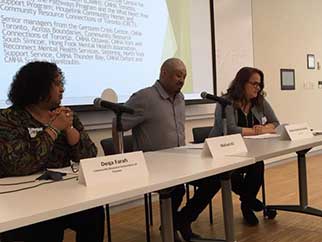
The Community of Interest (COI) for Racialized Populations and Mental Health and Addictions held a think tank this week to explore the potential of the Ontario Common Assessment of Need (OCAN) to advance health equity. The event brought together close to 80 participants from across Ontario, including representatives from hospitals, community-based mental health and addictions agencies, research institutes, and people with lived experience of mental health and/or addictions issues and racialization. During the morning, Jennifer Zosky from Community Care Information Management and Frank Sirotich from CMHA Toronto provided a comprehensive overview of the OCAN in Ontario as well as its potential to measure the needs of racialized communities. The OCAN is a standardized assessment tool for the community mental health sector, which also provides data that can be used to improve services. One potential limitation of the tool for racialized populations is that it currently does not ask directly about race. While it does ask about ethnicity and culture, both presenters agreed that equating those categories with race is problematic.
Following the overview of the tool Zahra Ismail, Policy Analyst at Canadian Mental Health Association (CMHA), Ontario, shared COI findings from a focus group with direct service providers and persons with lived experience from racialized communities about their views on using the OCAN. One of the advantages identified by service providers is that OCAN can be used as a tool for service planning since it facilitates information sharing and avoids service duplication between providers. Individuals with lived experience were divided in their views of the OCAN: while some felt it was useful in identifying their needs and connecting them with valuable services, others noted that they felt uncomfortable answering some of the questions, describing them as “invasive” and “illness oriented.”
A plenary session following Ismail’s presentation expanded upon these benefits and challenges. Deqa Farah from Community Resource Connections of Toronto and Helen Gottfried-UnRuh from CMHA Ottawa spoke further of the challenges faced by service providers, and Mahad Ali spoke of the benefits and limitations for persons with lived experience. During the afternoon, facilitated discussion groups engaged participants in dialogue on how the tool can be improved for racialized populations.
The session was simultaneously broadcast live online so that people across the province could participate in the discussions. CMHA Ontario also live tweeted the event using the #OCANEquity hashtag. Podcasts of all the sessions as well as presentation materials will be available online in the coming weeks. For more information, visit the COI website.